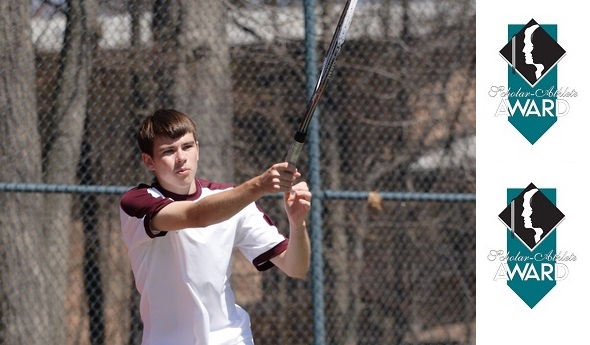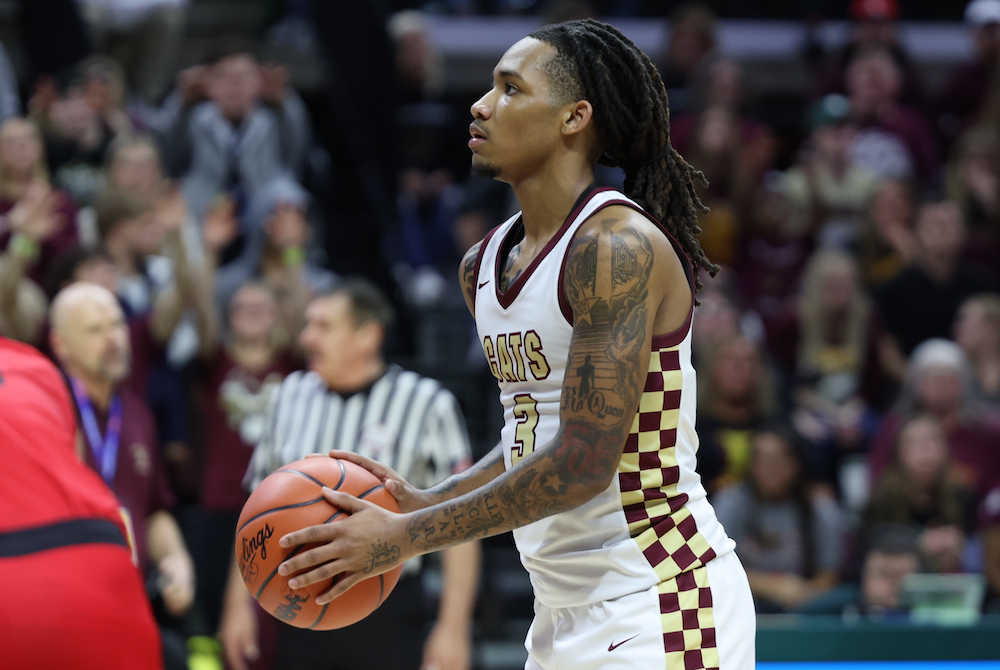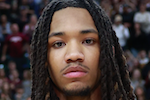
Goorhouse Gives Back at Home
By
Geoff Kimmerly
MHSAA.com senior editor
January 24, 2014
By Geoff Kimmerly
Second Half editor
Three traits have been key in making Holland Christian grad Mike Goorhouse nationally-recognized as a civic leader on the rise.
He’s a strong communicator, which comes in handy when coordinating support for causes all over the state.
He’s a relationship builder, allowing him to develop strong rapport as he explains how everyone can give something back to their communities.
 Finally, Goorhouse is a philanthropist – not just in job, but in life. He is the vice president for donor development at the Community Foundation of the Holland/Zeeland Area, where he works to raise support for nonprofit organizations. He also has served on the boards of directors/trustees for eight organizations, and he and his wife financially contribute to more than 15.
Finally, Goorhouse is a philanthropist – not just in job, but in life. He is the vice president for donor development at the Community Foundation of the Holland/Zeeland Area, where he works to raise support for nonprofit organizations. He also has served on the boards of directors/trustees for eight organizations, and he and his wife financially contribute to more than 15.
But a fourth quality, nurtured during his tennis and soccer careers, has been an asset as well for the 2003-04 MHSAA Scholar-Athlete Award winner.
“I always loved the competition side of sports. I talk to people who own companies, run companies, run shops. The reason they hire people who were involved in athletics is because of that drive,” said Goorhouse, 27, who was named in 2011 as one of the top 30 civic leaders nationally under the age of 30 by online networking site Splashlife. “Not everyone has that drive to succeed, to win, get a goal.
“Succeeding in the non-profit world looks a lot different. But it takes the same drive.”
 Goorhouse was among scholar-athletes recognized during the winter of 2004 by the MHSAA and Farm Bureau Insurance, which continues to sponsor the Scholar-Athlete Award program that has grown to honor 32 recipients annually. In advance of this March’s 25th celebration, Second Half is catching up with some of the hundreds who have been recognized (see additional links at the bottom of this page).
Goorhouse was among scholar-athletes recognized during the winter of 2004 by the MHSAA and Farm Bureau Insurance, which continues to sponsor the Scholar-Athlete Award program that has grown to honor 32 recipients annually. In advance of this March’s 25th celebration, Second Half is catching up with some of the hundreds who have been recognized (see additional links at the bottom of this page).
Earning a Scholar-Athlete Award likely meant more to Goorhouse than many of the other 607 who have been recognized over the quarter century. His grandfather, father and brother all have served as MHSAA officials, and his dad and brother both coach as well.
Mike also is part of a third generation of Goorhouses who annually attend the MHSAA Boys Basketball Finals, during which the Scholar-Athlete winners are recognized. He joined his dad and grandfather starting at 8 or 9 years old, and every year would read the bios of Scholar-Athlete Award winners in the Finals program and watch them line up on the court during halftime of the Class C championship game.
“Honestly, I wanted to be that,” Goorhouse said. “I had a lot of respect for the ability to balance academics and sports, and be good at both."
Goorhouse won the MHSAA Lower Peninsula Division 3 tennis title at No. 4 singles as a sophomore in 2002 and returned to the Finals at the No. 1 flight as a senior. He also played soccer at Holland Christian and then played tennis at Calvin College.
Tennis exposed Goorhouse to handling pressure on an individual basis while building mental toughness. Soccer was more about blending teammates’ skills and developing communication among the group.
“Everyone has his or her own version of the story, and that makes it more true; sports teaches a lot about leadership, and just about life and navigating the ups and downs, emotions, handling yourself under stress,” Goorhouse said. “I was in two way different sports, and it was fun to be able to see how those two things impacted me differently.”
As high school students begin focusing on college and potential occupations, professional giver probably isn’t an option many realize is possible. Goorhouse would’ve been counted in that group while at Holland Christian until becoming a member of the Community Foundation’s Youth Advisory Council. That opportunity joined him with many of his sports opponents from around the Holland area as they assisted the foundation in grant making for youth causes.
The philanthropy bug stuck. After his freshman year at Calvin, Goorhouse interned with the statewide Council of Michigan Foundations, which then hired him parttime as a college sophomore and fulltime once he graduated.
He returned to the Community Foundation in 2012 and works with 1,500 donors who contribute to the Holland/Zeeland area.
As donations grow, so does the foundation’s ability to give grants. But it’s not all about money. An oft-quoted definition of philanthropy is the “giving of time, talent and treasure” – and Goorhouse, as he speaks to various groups, makes sure to emphasize “and” as the most important word of that statement while encouraging donors to give of themselves in all three ways.
“It’s who I am as a person that fits this job so perfectly. It’s hardly work,” Goorhouse said. “When they’re thinking about giving back to the community, they’re at their best. I get to talk about what they care about.”
Goorhouse earned his bachelor’s degree in secondary education and then a master’s in public administration from Grand Valley State University. He’s able to take advantage of his relative youth in the professional world to connect with high school students and explain to them the opportunities to give back as part of the non-profit world. He serves on the boards of generationOn and Learning to Give, which both focus on integrating service into pre-college education.
While the national recognition in 2011 might’ve carried the most significance among honors Goorhouse has received, another he earned in 2009 has been his most meaningful on a personal level.
He was honored with the inaugural Young Philanthropist of the Year award by the Community Foundation. He didn't begin work for that organization until three years later, but giving back in his hometown always has been close to his heart.
“I love this place. It’s not that I can only do this work here, but it’s extra special to do the work you love in the place that you love,” Goorhouse said. “I could’ve lived anywhere because I would be on the road regardless. But to come home where my family and friends are, to the community I know best, it’s special.”
Click to read the series' first installments:
- 25 Years Later, Scholar Athletes Shine On
- On Call as Doctor, Director, Mom
- "Mailloux Management" Goes Global
PHOTO: Mike Goorhouse sends a volley while playing tennis for Holland Christian. He won an MHSAA Scholar-Athlete Award in 2004. VIDEO: Goorhouse speaks in 2004 about playing for his high school tennis coach John Knoester.

Performance of the Week: Niles Brandywine's Jaremiah Palmer
March 21, 2024
 Jaremiah Palmer ♦ Niles Brandywine
Jaremiah Palmer ♦ Niles Brandywine
Senior ♦ Basketball
Palmer capped his high school career Saturday with 18 points, six rebounds and three steals as Brandywine defeated Detroit Old Redford 56-48 in the Division 3 championship game to earn the school’s first Finals title in boys basketball. He also had 12 points, five rebounds and a pair of steals in Brandywine’s 51-48 Semifinal victory over McBain two days earlier.
The 6-foot-1 forward averaged 13.8 points, 5.8 rebounds and 3.4 assists per game this season and started last year as a junior as well when Brandywine won its first Regional title and reached the Semifinals. He’ll play baseball this spring and played football earlier in his high school career.
@mhsaasports 🏀POW: Jaremiah Palmer #basketball #finals #champion #letsgo #brandywine #part1 #highschoolsports #tiktalk #interview #performanceoftheweek #mistudentaid #fyp #MHSAA ♬ original sound - MHSAA
@mhsaasports 🏀POW: Jaremiah Palmer #tiktalk #questiontime #part2 #lebron #sourskittles #burger #fries #cheese #laughingemoji #performanceoftheweek #mistudentaid #fyp #MHSAA ♬ original sound - MHSAA
Follow the MHSAA on TikTok.
MHSAA.com's "Performance of the Week" features are powered by MI Student Aid, a division within the Department of Lifelong Education, Advancement, and Potential (MiLEAP). MI Student Aid encourages students to pursue postsecondary education by providing access to student financial resources and information. MI Student Aid administers the state’s 529 college savings programs (MET/MESP), as well as scholarship and grant programs that help make college Accessible, Affordable and Attainable for you. Connect with MI Student Aid at www.michigan.gov/mistudentaid and find more information on Facebook and Twitter @mistudentaid.
Past 2023-24 Honorees
March 15: Leah Hodge, North Farmington gymnastics - Report
March 8: Darius Marines, Detroit Catholic Central wrestling - Report
March 1: Rylee Smith, Zeeland West bowling - Report
Feb. 22: Caleb Lewandowski, Traverse City West skiing - Report
Feb. 15: Jadin Mix, Onaway basketball - Report
Feb. 8: Onalee Wallis, Cadillac skiing - Report
Feb. 1: Abbey DeGraw, Rochester Hills Stoney Creek competitive cheer - Report
Jan. 25: Ewan Todd, Riverview swimming - Report
Jan. 18: Ashley Weller, Jackson Northwest basketball - Report
Jan. 11: Michael Baldwin, Saginaw Arthur Hill wrestling - Report
Dec. 15: Jena Fijolek, Fenton bowling - Report
Dec. 8: Sophia Wagner, Escanaba gymnastics - Report
Dec. 1: Isaiah Marshall, Southfield Arts & Technology football - Report
Nov. 24: Sarah Bradley, Clarkston Everest Collegiate volleyball - Report
Nov. 17: Kalieb Osborne, Waterford Mott football - Report
Nov. 10: Tekalegn Vlasma, Muskegon Western Michigan Christian soccer - Report
Nov. 3: Colton Kinnie, Birmingham Seaholm football - Report
Oct. 27: Lauren Timpf, Macomb Lutheran North golf - Report
Oct. 20: Alena Li, Okemos golf - Report
Oct. 13: Seth Norder, Grand Haven cross country - Report
Oct. 5: Paige Anderson, Muskegon Reeths-Puffer golf - Report
Sept. 29: MacKenzie Bisballe, Lake City volleyball - Report
Sept. 22: Jhace Massey, Gladwin football - Report
Sept. 15: Kaylee Draper, Sturgis swimming - Report
Sept. 8: Owen Jackson, Traverse City St. Francis tennis - Report
Sept. 1: Rachel Forsyth, Ann Arbor Pioneer cross country - Report
(Photos by Hockey Weekly Action Photos.)

